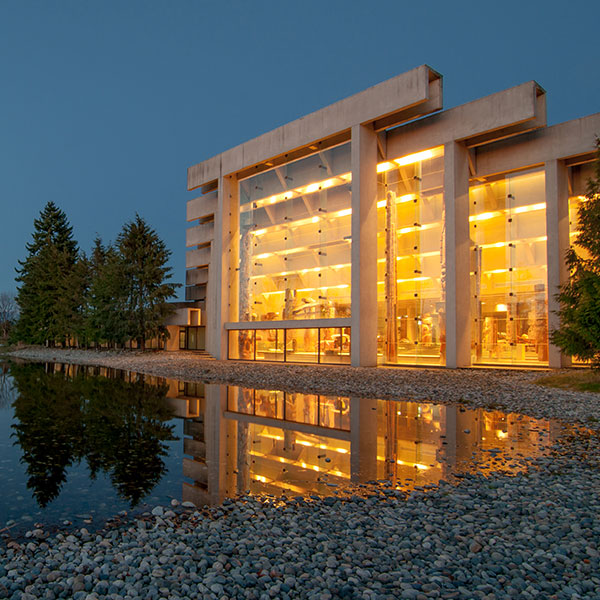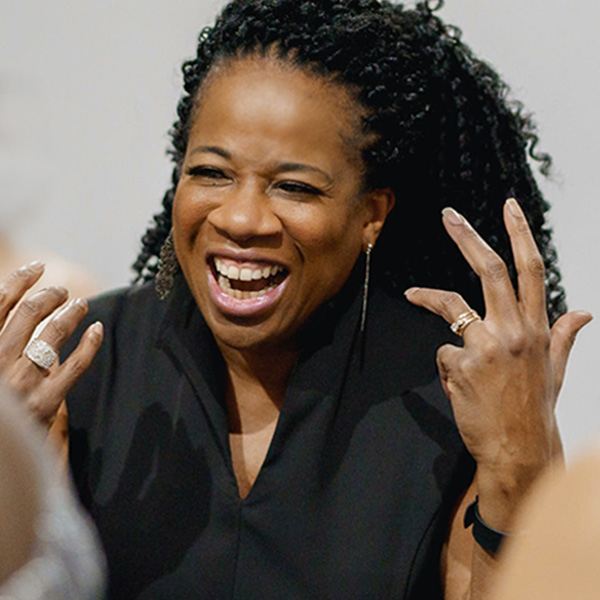What does it mean to be an American in the 21st century? What are the core ideals in which Americans have found common cause and are those ideals still powerful enough to unify people during increasingly fraught and divisive times?
These are some of the themes that are explored in American Creed, a new film co-written and directed by Sam Ball, BA’91. The film will be broadcast nationally in the U.S. on February 27 on PBS and an extended version of American Creed will begin streaming online at PBS.org the next day.
“The project stems from a running dialogue that two Stanford University professors have been having with one another for many years,” says Ball. The two professors are friends and longtime colleagues who don’t always see eye-to-eye. Condoleezza Rice is a conservative, Stanford’s former provost and a former U.S. secretary-of-state in the George W. Bush administration. David M. Kennedy is a progressive-minded historian best-known for his Pulitzer Prize-winning work on Franklin D. Roosevelt.
The film focuses on a seminar course on American ideals at Stanford that the two are leading together, but it also spends time with a diverse group of Americans – including Chicago Cubs manager Joe Maddon and acclaimed novelist Junot Díaz – who have their own unique perspectives.
Maddon hails from Hazelton, Pennsylvania, a working-class town that has fallen on hard economic times, exacerbating tensions between longtime residents and recent immigrants. Maddon is supporting initiatives aimed at bringing people together – sports teams that include kids from both communities, for instance.
For his part, Díaz challenges America’s obsession with individualism in the film, arguing that significant advances in any society are the product of collective action. “The claim that there is no nation better at unleashing individual potential – I guess I don’t buy it,” the writer says. He also says that one way to love a country is to point to its flaws, in the hope that things can improve.
“We wanted to focus on people who all feel very passionately about their own vision of an American creed,” says Ball. “There are nuances and differences in those visions. We wanted to look at some of the most fertile areas of discussion between Rice and Kennedy.” Those themes include the role of the public school system, the notion of “equal opportunity,” and the increasing loss of civility in American public life.
“David Kennedy says these are arguably the most fractious times [we’ve experienced] since the civil rights era,” says Ball. “I think it’s important to point out, though, that these moments of seeming unravelling are part and parcel of the history of the United States. It’s a very turbulent history. Condoleezza Rice said something that I appreciate, that one way to look at American history is as a series of litigations over who gets to be included in ‘we the people,’ who gets to be included in America’s shared aspiration.”
Ball says the title for the film comes from a phrase used by Gunnar Myrdal, a Nobel-Prize winning economist and sociologist who was once commissioned by the Carnegie Foundation to study race relations during the Great Depression. “His thesis was that there was a shared American creed that was derived from the founding documents and that even some of the most racist people he interviewed believed in these notions of fairness and equal opportunity and that individuals are captains of their own fate. He felt that the way to change attitudes toward race was to appeal to this creed and to appeal for inclusion based on this creed. Martin Luther King was among Myrdal’s most attentive readers.”
Some of the other individuals highlighted in American Creed include Marine Corps sergeant Tegan Griffith, who hails from a proud military family and sees the right to protest as one of the values that she defends. Eric Liu, a former speechwriter for Bill Clinton and now a civic engagement activist, makes the case for being involved in politics, otherwise, “you cede the field to the few who would like to command the field … and don’t have your interests in mind.”
Ball studied political science at McGill and made an important discovery while he was here. “As a student at McGill, it was fairly easy to borrow camera equipment. My first film was about the 55 bus that runs along Saint-Laurent.”
Ball is one of the co-founders of Citizen Film, a nonprofit production company that uses documentary storytelling to focus attention on social issues. “We think of everything we do as not just a story, but a campaign.”
Thanks to partners like PBS and groups like the National Writing Project and Facing History and Ourselves, American Creed hopes to have an impact beyond its appearance on television. A suite of short related films will be made available to teachers across the U.S, PBS stations are co-organizing public screenings with community partners in different parts of the country, and a national essay writing contest related to the film will be launched at the South by Southwest festival in Austin, Texas, in March.
In one of the longer version of the film’s more hopeful moments, Joan Blades, a co-founder of the progressive advocacy group MoveOn.org, begins her own tentative dialogue with Mark Meckler, a co-founder of one of the most influential grassroots groups affiliated with the Tea Party movement. They joke that politicians would really have cause to be fearful if they ever agreed on anything – and then they start realizing that they might. Both express concerns about the power of banks, for instance.
At one point in the film, Rice says, “If you constantly find yourself in the company of those who say ‘Amen’ to everything that you say, find other company.”
“I worry that the level of discourse [in the U.S.] has gotten so shallow that we’re not having meaningful conversations,” says Ball. “We need to be emotionally connected to the ideals of American democracy if we’re going to make progress. We need to talk about why these things matter to us to be able to envision the future. That’s a muscle we need to develop as a society.”


